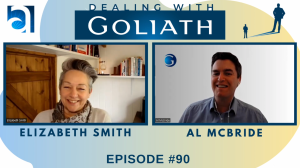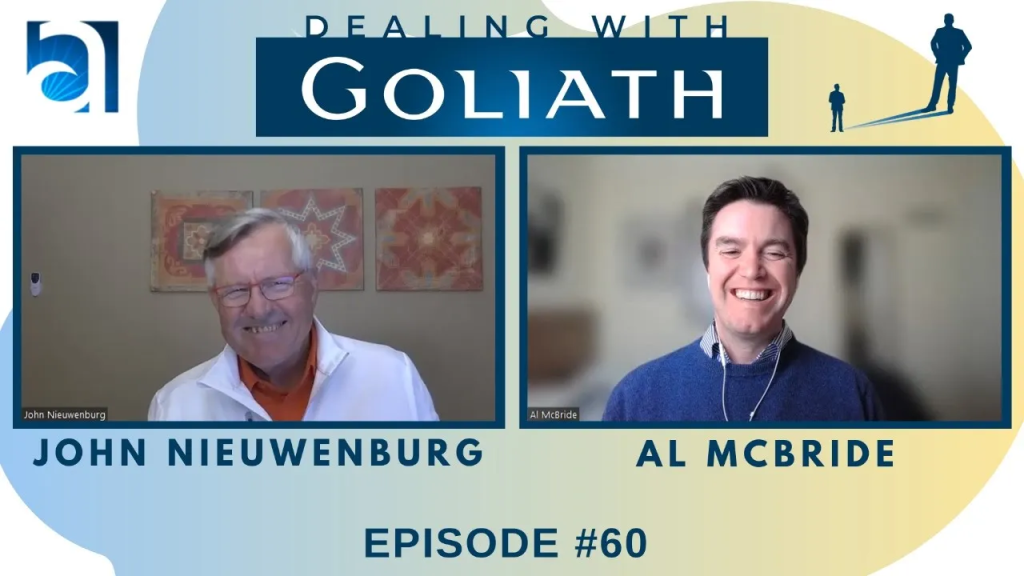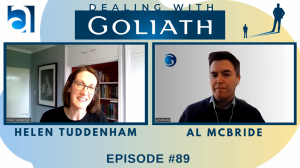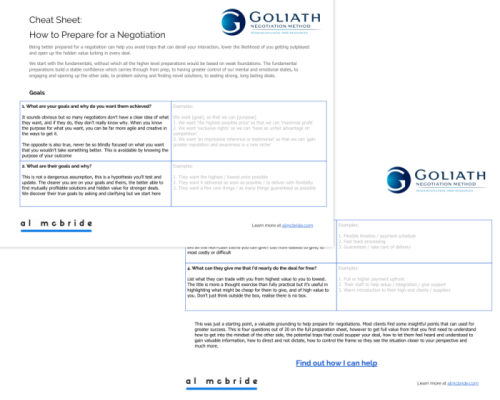

For a Better Business Be a Better Business Owner with John Nieuwenburg #060
Show Notes:
John Nieuwenburg is an award-winning Business Coach who has worked with hundreds of clients. As there are almost as many different ways of delivering business coaching as there are business coaches. John coaches in 3 primary areas.
Business: getting things done using proven tools, strategies and techniques to grow your business.
Personal Growth: working with you in decision-making, leadership, delegation and time management skills.
Accountability: helping you to stay accountable for the results you have chosen, that up until now may have been just a dream.
In an earlier life, John was the Managing Director of the BC Liquor Stores that now does $3 Billion in revenue with a net income of $1B. Before that, he was an Executive with a national menswear retailer.
When not coaching, John hangs out with his wife, Jennifer! John enjoys golf, skiing, running and reading.
Topics explored:
- Business owners usually challenged in one or more of the big 3: Time, Team or Money
- Running out of ideas of what needs to change
- Leading and Delegation from ‘the only one with the toolbox’ to sitting in the captain’s chair of the enterprise.
- Where are you generating $500 per hour and where am I generating $10 or $15 per hour?
- Around 85% of what happens in a business ought to be routine
- The importance of SOPs and checklists, simple systems with impact
- Never look for a people solution, look for a systems solution
- Systems run your business, people run your systems, you lead the people – systematise the routine, humanise the exception
Transcript
Al McBride 0:02
Welcome to the dealing with Goliath podcast. The mission of dealing with Goliath is to sharpen the psychological edge in negotiation, ethical influencing and high impact conversations for business leaders who want to be more effective under pressure, uncover hidden value, and build greater connection all while increasing profitability. With expert guests across the business spectrum. We deliver Gems of Wisdom delving into their methods, their thinking and approach to business life to problem solving. This is the short form espresso shot of insight podcast interview to boost business performance, using our five questions in about 15 minutes format. My guest today is John Nieuwenburg, John is an award winning business coach who’s worked with hundreds of clients.
As there are almost as many different ways of delivering business coaching as there are business coaches, John coaches in three primary areas first of all business, getting things done using proven tools, strategies and techniques to grow your business. The second personal growth working with you in decision making leadership, delegation, and time management skills. And thirdly, accountability helping you stay countable for the results you’ve chosen. And open till now may have just been a dream. So John helps his clients get there. It’s outstanding. In an earlier life, John was the managing director of the BC liquor stores that now does $3 billion in revenue with a net income of $1 billion rousers. And before that he was an executive with a national menswear retailer. Excellent stuff. John, welcome to the show. Thank you for coming on.
John Nieuwenburg 1:41
My pleasure. Thanks for having me.
Al McBride 1:43
Well, just to pick apart some of the really interesting, short bio there on you, just to clarify who is your ideal client, and what’s the biggest challenge that they face?
John Nieuwenburg 1:55
I have two kinds of ideal clients there. On one hand, they’re professional advisors. So they’re accountants and lawyers, and health practitioners, coaches, realtors, we all provide professional advice. The Voice, of course, is different. The challenges those businesses and business owners face are often similar. And they are the kind of client is people in a trade or a craft. Again, they’re electricians and plumbers and that kind of thing. And again, they have the same kind of problems that are, you know, very skilled in their craft. They’re just skilled in their professional, every good in business.
Typically, they’re challenged around time, time or money. So they’re often saying things like, I’ve got too much to do, and not enough time to do it, I can’t get everything done. If I don’t do it, it won’t get done. When it comes to Team hiring, recruiting is very difficult these days, globally. But it’s also difficult to get, you know, the culture and the business you want and getting people to do the work at the level of the quality you need. Then money has got two components to it. One side of money is the accounting, financials reporting cashflow. And the other side of money is I need more money, I need better sales and marketing. Excellent stuff.
Al McBride 3:03
So the recovering Time Team money just cover a huge amount of advice. You said some of those stressors, that business people who it seems like you’re dealing with a lot of people are probably expert, what they do, but as you said, not experienced or knowledgeable, quite enough about the mechanisms of doing business, the business itself. So what are some of the common mistakes that people make when they’re trying to, to solve that problem to get better in those areas?
John Nieuwenburg 3:30
Well, that they run out of ideas about how or what needs to change. So they’re often I use a metaphor here of a hub and spoke manager. So they’re the hub of the wheel. And nothing happens on their business unless something goes through their brain or receives a set of instructions. And so generally the not we’re pretty good at delegating, we often think of delegating what the actual do is abdicate or they micromanage the one of those two kinds of extremes. And so they are often in any of these challenges, they often get to a place where they hit a wall of whatever their capabilities have been. And they don’t know what to do differently. And so they they just go like, you know, a hamster on a wheel and they just cannot go any faster. And even that has
Al McBride 4:15
absolutely leads to overwhelm. I’d imagine a lot of discomfort. One of the things I particularly enjoyed on your website and on your blog was that you tend to start with the individual, you tend to start with the person doing the business, not just as I said, giving people tactics immediately you start with the person. Can you tell us why you take that approach?
John Nieuwenburg 4:38
Well, there’s a bunch of different things, but what is the purpose of a small business? So the reason I’m gonna or the purpose for a small business that I’m going to offer you isn’t the same if it’s a 50 100 million dollar business, lots more complexities and stakeholders and so forth. But for the average small business owner the purpose of that business supposed to give its owner the life they want. And so nobody was born, the business we are born to live and we offer and business owners often get that mixed up and their their business takes over their life and they have no life left. So there’s a couple of things about it. There’s a hidden secret here around that. Almost all business problems, are personal problems in disguise,
i could not agree more.
If the owner wants a better business, first, the business needs a better owner. Yeah, so typically, it’s about systems skills and strategies. But often, as much as anything, it’s about skills and in leadership, communication, delegation, and it’s also about mindset, the shift in mindset that’s required to go from, you know, feeling like you’re the only guy who can operate with a toolbox to how do I get to be in the captain’s chair, and lead the enterprise rather than doing more of whatever the product or the profession I have?
Al McBride 5:58
Absolutely, I love that, because as you say, so often, people are essentially there may be the business owner, but they essentially just have another job.
John Nieuwenburg 6:09
That’s very much the case they, they have a job in the business with their name on it.
Al McBride 6:13
Exactly, exactly. So with that in mind, what might be one valuable free action that you could recommend to an audience to implement that will help them get on the right path.
John Nieuwenburg 6:25
If you have to work with a business owner that isn’t able to find five to seven hours worth of work that they do routinely, and they’re weak they shouldn’t be doing. And so the way to find that is, there’s two easy ways to do that. One is to keep a diary for a week, and increments of about 15 minutes of what you’re doing with your time. And the point of this exercise is to at the end of the week, you’ll identify where do I create the most value? Where am I generating three, four or $500 an hour? And where am i doing work that someone else would do better than me? more qualified than me, and they’ll happily do it, you know, often overseas for 10 or $15 an hour. So that’d be step one. Or step two, the other way, there’s a hack. You don’t have the will or discipline to do the survey is just anytime you go, Oh, crap, I need to do X. That’s your club.
Al McBride 7:19
Absolutely. I love it. It’s that idea of you know, what hat am I wearing? Is it $10 An hour work? Is it $500 an hour? Is it somewhere in the middle? Yeah, if it’s lower down that list, pass it over to someone who will enjoy doing it. Yeah, yeah, exactly.
John Nieuwenburg 7:35
And, you know, with the way the internet works now, and zoom, you can find VAs everywhere that are very, very qualified. And typically nowadays, we get arbitrage in two ways. One, we get the most qualified people in their respective country. And we get arbitrage on the foreign that $10 an hour for someone in the Philippines as an example or in South America has meaningful income. It’s absolutely your
Al McBride 8:01
doctor salaries like yeah, in their country. Yeah.
John Nieuwenburg 8:05
The average income in the Philippines is $5,000. us if you’re paying someone $10 an hour, 2000 hours is a standard year, that person is making 20 grand. That’s yeah, handsome income, right. And so we often get sort of hung up, how can I get someone who’s any good? Well, they’ll often have university degrees that are very qualified to do you know, your you need someone to help you with doing construction estimating, or find you have civil engineering, don’t know what to do.
Al McBride 8:33
Absolutely, absolutely. And the second much smaller bonus is also the time that you can set a task as you’re finishing work. When you wake up the next morning, you have the equivalent of a day’s work handed to you. Yeah,
John Nieuwenburg 8:48
exactly. When I first heard just as a kind of a tip here, when I first started my VA, knowing me, she gave me a wonderful surprise. So I asked her to do something. And we had a Zoom meeting. And within 30 minutes of the end of the call, she sent me an SOP, a standard operating procedure of everything I asked her to do. And it was like, Oh, my gosh, this is wonderful. And what I learned from that is the person doing the work ought to be the one who writes the SOP. Right?
So you don’t even have to write the SOP because those are tedious things to do. And why did they do that? Well, first of all, they’ve demonstrated they understand exactly what’s required. The SOP is written so well, I could give this to any reasonable person anywhere in the world, and then they’d be able to duplicate the work. And so that’s one of the great things that I learned from having a VA is they write the SOP based on, you know, a zoom recording or some kind of set of instructions and, and so the, the, the the worry most business owners have that the work won’t get done at the level you need is absolutely overcome.
I was going to say something else, but that shouldn’t be a bother for you because you can get a perfect reflection. It’s You know, it’s how do they, as often say, how do they get those French fries to taste the same anywhere in the world. And the fries are made by a 16 year old and the parents of that person 16 year old, can’t get him or her to clean their bedroom?
Al McBride 10:15
Right? It’s the SOP. Yes. recipe. This is how we do it. Yeah. It’s, it’s, as he says, but it also means it’s unlikely people can miss or skip steps by accident so that you’re fully covered in that benefits of a checklist idea? Absolutely.
John Nieuwenburg 10:36
You know, sometimes people kind of object to getting that systematic or think that, you know, they’re kind of above it, or they don’t need it. But let me ask you something. Would you get on an airplane? If you knew the pilot didn’t do the pre flight
Al McBride 10:48
checklist? Absolutely not. Yeah. That pilot is
John Nieuwenburg 10:53
making 123 $400,000 is very capable, very well trained, very skilled, very intelligent. And yet, the human mind doesn’t good at doing repetitive tedious kinds of things. And so we need the support of a checklist or an SOP. And so in fact, I’m sure none, none of us would ever want to be operated on by a surgeon who didn’t do the pre surgery checklist. Like, let’s just check, make sure we got or, you know, I started with 30. scalpels. Let’s make sure we still have 30 left at the end of this thing.
Al McBride 11:25
Absolutely. There’s a great book there a few years ago called checklist and was about one of the examples was London Children’s Hospital, and how they implemented the checklist system in the surgery room, and healing times improved mistakes dropped through the floor, and everything got better.
John Nieuwenburg 11:45
That book is called The Checklist Manifesto.
Al McBride 11:48
manifesto. Remember,
John Nieuwenburg 11:51
one day and if there’s anything you do, or any of your listeners do read that book,
Al McBride 11:56
it’s a great recommendation I can second. So what along those lines, what might be one valuable free resource that you can direct people to that will help them again, with this trajectory with this change?
John Nieuwenburg 12:10
You know, I probably have at least 300 blog posts, what we’ve done is organize them around the hub or around themes. And so there’s a hub post on all the blog posts that have to do with how to manage your time and productivity. So if there’s any place that you go, that says how can I get better about managing my time or being more productive or having better delegation skills? There’s four Hub Pages there, but one of them focuses on time management in the product today.
Al McBride 12:44
Outstanding. And is that that’s the W five coaching.com/blog. Perfect, yeah, excellent. And I’ll of course link to that beneath this episode. But that’s, that’s an excellent, I have had a look through it. And there’s just, it is a wealth of value there. I’d recommend everyone get on there, bookmark it and just keep returning to it on a regular basis. And think about it implement some of these points. And of course, reach out to John, if you’re ready to do that. Because the information and the knowledge and the expertise is quite superb. So with that in mind, John, what’s the one question I should have asked you, that will be of great value for our audience
John Nieuwenburg 13:28
that a business can be built on, I’m going to use a metaphor of a three legged stool. So the first of the three legs as this philosophy of systems, run your business, people run your systems, you lead your people. So that’s like one. So we’ve already talked, how did they get those French fries? They have great systems, right? So if people run your business, then those people come and go, your business falls and rises on the quality of the people of systems run your business, people can come and go, but the business of stables so that’s like one, like two is systematize the routine humanize the exception.
So about 85% of what happens in a business ought to be routine, we just do it. This is how we do it every day, this is what we do. But in my example, one day we run out of potatoes. Oh no, what are we gonna do? Well, now I gotta go find a manager and they’re gonna help me out with that. And then the third leg of the stool is never look for other people solution look for system solution. And so again, in this case, we’re running out of potatoes, what would the system have to be? So if that were ever happened again, we’d have a system we’d have a standard way of a methodology that we would employ to handle the circumstance of running out a potato subsystems run your business people run your systems, you lead your people systematize the routine humanize the exception. And the third one is always look for a system solution. Never have people solution. What would the system have to be?
Al McBride 14:57
It’s Johnny. That’s brilliant. Advice for everyone out there, as you said, I love the structure as well, as you can see how it all holds together? Yeah. Easier said than done.
John Nieuwenburg 15:09
Well, you know, that’s right. It’s It’s simple in description but hard and execution and AL the thing about what I do is it’s you can find this information on Google, the internet. The hard part is how do I make this happen? And, of course, that’s how a coach can help you out.
Al McBride 15:26
Absolutely. That’s the implementation part, making it into reality consistently being the key word. Well, thank you so much, John. That was fascinating conversation. Pleasure. It’s been brilliant to have you on the show. Talk to you soon. Thank you.
Transcribed by https://otter.ai
Resources
The Checklist Manifesto
John’s over 300 blog posts: https://w5coaching.com/blog/
Ready for more:
If you’re interested in more, visit almcbride.com/minicourse for a free email minicourse on how to gain the psychological edge in your negotiations and critical conversations along with a helpful negotiation prep cheat sheet.
- TAGS: business, business owners, checklist, coaches, delegation, hour, hub, humanise, humanize, implement, people, qualified, sop, system, systematise, systematize


